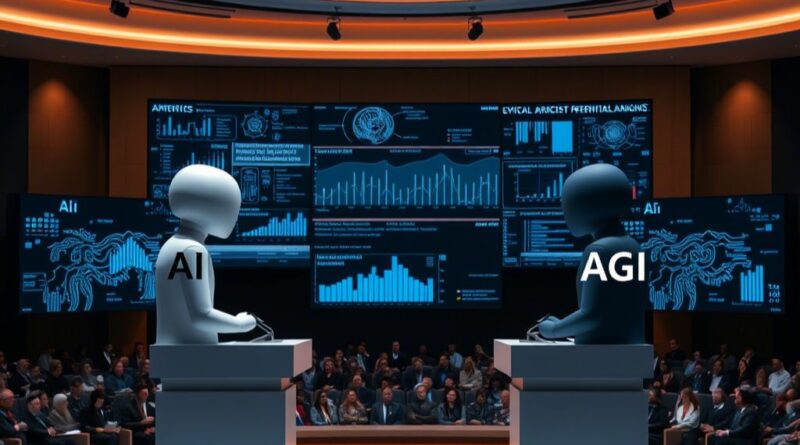The Next Frontier: AI vs. AGI
In recent years, artificial intelligence (AI) has become an omnipresent force in our lives—powering everything from voice assistants like Siri and Alexa to complex algorithms that recommend movies or predict stock market trends. Yet, as impressive as these advancements are, they represent only one side of the coin. On the other lies Artificial General Intelligence (AGI), often referred to as the “holy grail” of AI research—a system capable of understanding, learning, and applying knowledge across any domain, much like a human being.
But what exactly separates AI from AGI? And why does this distinction matter so profoundly for the future of humanity?
Artificial Intelligence: The Present Reality
At its core, artificial intelligence refers to machines designed to simulate human intelligence by performing tasks such as reasoning, problem-solving, perception, and language comprehension. Modern AI systems excel at specific functions within narrow domains. For instance:
- Chatbots can engage users in natural conversations but lack emotional depth.
- Self-driving cars navigate roads with remarkable precision but struggle with unpredictable scenarios.
- Medical diagnostic tools analyze vast datasets to identify diseases faster than humans, yet require human oversight for final decisions.
These examples illustrate how today’s AI operates within predefined parameters, relying on vast amounts of data and specialized algorithms. This type of AI is known as narrow AI—a term used to describe systems optimized for particular tasks without broader cognitive abilities.
Narrow AI owes its success to decades of breakthroughs in machine learning, particularly deep learning techniques powered by neural networks. These technologies enable computers to recognize patterns in large datasets, improving their performance over time through training. However, despite their sophistication, current AI systems remain limited by their inability to generalize beyond their training scope.
Artificial General Intelligence: The Future Vision
Enter Artificial General Intelligence, a concept that transcends the limitations of narrow AI. Unlike its specialized counterpart, AGI aims to replicate the full range of human intellectual capabilities. An AGI system would possess:
- Cross-domain adaptability: It could learn new skills independently and apply them flexibly across different contexts.
- Common sense reasoning: It would understand implicit meanings, social cues, and abstract concepts.
- Creativity and curiosity: It could generate novel ideas, explore unknown areas, and even question its own assumptions.
Imagine an AGI assistant not just scheduling your meetings or ordering groceries but also engaging in philosophical debates, composing original music, or designing innovative solutions to global challenges. Such versatility makes AGI both exhilarating and unnerving—a potential game-changer for society.
However, achieving AGI remains one of the most formidable challenges in computer science. While we’ve made significant strides in AI, creating a truly intelligent system requires solving several key problems:
- Understanding consciousness: How do we model self-awareness and subjective experience?
- Handling uncertainty: Humans thrive in ambiguous situations; replicating this capability in machines is no small feat.
- Ethical alignment: Ensuring AGI aligns with human values and priorities poses profound moral dilemmas.
Key Differences Between AI and AGI
To better grasp the divide between AI and AGI, consider the following distinctions:
| Aspect | AI (Narrow AI) | AGI (General AI) |
|---|---|---|
| Scope | Specialized for specific tasks | Capable of handling any intellectual task |
| Learning Ability | Trained on labeled datasets | Learns autonomously and adapts dynamically |
| Adaptability | Limited to trained scenarios | Can generalize knowledge across diverse domains |
| Decision-Making | Follows pre-programmed rules or statistical models | Exhibits nuanced judgment and creative thinking |
| Awareness | No intrinsic understanding or awareness | Possesses some form of self-awareness |
While AI excels at executing repetitive or data-intensive tasks, AGI promises to bridge the gap between machine efficiency and human-like cognition.
Why Does AGI Matter?
The pursuit of AGI raises critical questions about the nature of intelligence itself. If successful, it could revolutionize industries, extend human lifespans, and unlock unprecedented scientific discoveries. Imagine AGI-driven innovations in medicine, climate modeling, or space exploration—each field stands to benefit immensely from a versatile, autonomous intelligence.
Yet, the development of AGI also carries risks. A superintelligent system, if misaligned with human goals, could pose existential threats. As renowned physicist Stephen Hawking once warned, “Success in creating AI would be the biggest event in human history. Unfortunately, it might also be the last.” This sentiment underscores the importance of responsible AI governance and ethical frameworks.
The Road Ahead
Despite rapid progress in AI research, many experts believe AGI remains decades—or perhaps centuries—away. Some skeptics argue that AGI may never materialize due to fundamental barriers in neuroscience, philosophy, and technology. Others contend that incremental advancements will eventually lead us there.
Regardless of timeline, the journey toward AGI offers valuable insights into the essence of intelligence. By studying how machines process information, we gain deeper appreciation for the intricacies of human thought.
As we stand on the cusp of this technological frontier, one thing is clear: the relationship between humans and machines will continue to evolve. Whether AI evolves into AGI or remains confined to niche applications, its impact on society will shape generations to come.
Conclusion
From chatbots to chess champions, AI has already transformed countless aspects of modern life. But the quest for AGI represents something far grander—a bid to create synthetic minds as adaptable and insightful as our own. Though fraught with challenges, this endeavor holds immense promise—and peril—for humanity.
So, the next time you interact with a virtual assistant or marvel at a self-driving car, remember: these are merely stepping stones on the path to realizing true artificial general intelligence. Will AGI redefine what it means to be intelligent? Only time will tell.
Until then, let’s embrace the possibilities while remaining vigilant stewards of innovation.



